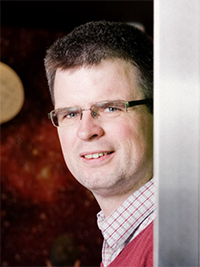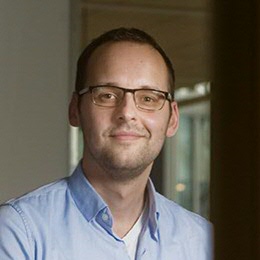Gert-Jan Romensen on the Venice-Groningen cooperation
Ca’ Foscari Venice and the University of Groningen co-organise a PhD workshop in Economics. FEB PhD student Gert-Jan Romensen shares his experiences with the Venice-Groningen cooperation.
Who is Gert-Jan Romensen?
'I am a second-year PhD Candidate at the Department of Economics, Econometrics & Finance, under supervision of Adriaan Soetevent and Marco Haan. When at Zernike, I can either be found at the seventh floor working on my PhD research or in a classroom trying to teach students the principles of microeconomics. You may also spot me near Micaffè brainstorming about existing or new research projects. When I am not at Zernike, I enjoy cooking and (try to) compensate this by setting my alarm clock early to go to the gym before work. I also appreciate good books and podcasts on topics related to microeconomics, behavioural economics and social psychology. When weather permits, I like to go for a walk in the Noorderplantsoen or cycle in the areas surrounding Paterswoldsemeer and Zuidlaardermeer. If Buienradar disagrees with my outdoor plans, however, I usually opt for the alternative of playing card games with my girlfriend, though sometimes tensions arise because we both cannot stand losing.'
What is your research about?
'My current research focuses on the question how workers can be motivated by non-financial incentives to conserve energy and fuel. I greatly enjoy working with companies to design and implement field experiments that evaluate these incentives. For example, during my time as a Research Master student I started working with Adriaan on projects together with a large public transport company. The company recently installed on-board computers in their entire fleet of buses and we use this technology to collect detailed trip-level data on driving behaviour. Given the high-frequency character of the data, we are able to measure both immediate and delayed responses of bus drivers to various non-financial incentive schemes. More in general, being part of the signature area Markets & Sustainability, I enjoy thinking of and developing research projects that shed a field experimental light on topics pertaining to worker and consumer behaviour in sustainability contexts.'
What are the benefits of this cooperation?
'The Groningen-Venice PhD workshop is a great venue for PhD students to get detailed feedback from peers and senior researchers. The workshop allows both parties to benefit from each other’s expertise. In an informal yet professional setting, each student gets ample time to present a recent paper, after which extensive comments are provided by the audience and a discussant. Furthermore, senior researchers from Groningen and Venice talk about their latest work and share their insights on doing good research. The day-long program ensures that there is enough time to interact and to exchange ideas about current and new research. After participating in two editions, first as a spectator in Groningen and later as a presenter in Venice, I can truly say that the workshop succeeds in creating an environment which stimulates discussion and creative thinking, while simultaneously nudging students in the right direction with their projects. Finally, I personally believe that it is important for PhD students to gain experience in presenting their work in international settings. Collaborations such as the Groningen-Venice PhD workshop make this possible.'

Adriaan Soetevent
'There are many ties between the University of Groningen and Ca’ Foscari Venice. Some of our staff originates from Venice and starting this year, the two schools also have an Erasmus+ agreement for student exchange at the undergraduate level. It is mutually beneficial to extend this exchange to the PhD-level.
The joint workshop adds to the PhD program at both departments: it structures the PhDs research by providing them with an additional important deadline towards which they can work; selected students receive valuable feedback from the discussant and general audience.
As organizers, our impression is that the meetings have been very fruitful in providing PhD students with pointed comments on their work in an early stage. In a number of cases the workshop has also initiated more structural contact between students from both faculties.”
| Last modified: | 21 September 2023 4.27 p.m. |

